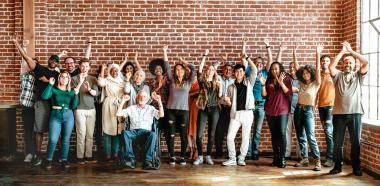Acerca de nosotros
Equidad y justicia para todos, en todo el gobierno estatal.


La equidad exige un compromiso de acción audaz.
Fundamentalmente, reconocemos que el gobierno estatal no siempre ha funcionado bien para muchas personas. A pesar de que los servicios gubernamentales han beneficiado a algunas familias, también existen prácticas, políticas, procedimientos y personas que han perjudicado a las de la mayoría global. Somos honestos al respecto y lo tenemos en cuenta en todo el trabajo que realizamos. Por eso nuestra infraestructura se basa en la pro equidad y antirracismo, PEAR (por su sigla en inglés). Debemos desarraigar estos ideales nocivos de nuestra manera de trabajar y de servir a los ciudadanos de Washington.
Somos diferentes ya que...
- nos esforzamos por responsabilizarnos con diligencia.
- somos audaces en nuestra transparencia.
- asumimos la responsabilidad incluso cuando pueda resultar incómodo.
- damos la bienvenida a las discusiones difíciles, sabiendo que podemos aprender y crecer a partir de ellas.
- trabajamos para desarraigar nuestros propios prejuicios inconscientes y la opresión racial interiorizada.
- nos comprometemos con la equidad racial y nos medimos abiertamente.
¿Desea saber un poco más sobre quiénes somos? Descargue nuestro folleto de una página sobre Quiénes somos para obtener más información.
Nuestra diferencia radica en que no nos conformaremos con menos que un gobierno que trabaje para todos los ciudadanos de Washington.
Únase a nosotros y sea usted también diferente.

Nuestro proceso
Establezca una base sólida
Centre la equidad en todas las leyes, políticas, normas, operaciones, programas, prácticas e interacciones.
Maximice el sistema que tenemos
Mediante una política, una integración y una colaboración más sólidas entre sistemas, sectores y jurisdicciones para aprovechar al máximo el sistema que tenemos.
Construya el sistema que necesitamos
Empiece por desmontar el racismo abordando las causas profundas a través de un cambio sistémico y cultural audaz y construya la justicia estructural y la pertenencia para las personas y los grupos que actualmente sufren discriminación, racismo o múltiples formas de opresión.

Nuestra promesa
Asociarnos
Nos asociaremos con otros para ser un Estado plenamente integrador, multicultural y antirracista.
Liderar
Lideraremos al Estado para que se convierta en una empresa gubernamental verdaderamente transformada, que incorpore la equidad y la justicia en todas sus acciones, y en la que hacerlo sea sencillamente la forma de trabajar del gobierno estatal.
Vivir nuestros valores
Nuestras acciones y decisiones se guiarán por nuestros principios y valores.
Construir relaciones
Estableceremos relaciones con entidades, comunidades y legisladores para reformular el gobierno estatal de modo que reduzca las diferencias de oportunidades y las disparidades y logre resultados equitativos y justos para todos los habitantes de Washington.

Nuestras prioridades
Desarrollar capacidad
Para desarrollar nuestra capacidad interna y reforzar nuestra estrategia, nuestras prioridades para el año incluyen cubrir todos los puestos vacantes en la Oficina, crear un sistema de seguimiento presupuestario y contratar a un experto en cabildeo y a un responsable legislativo.
Cumplir con nuestros mandatos
Cumplir nuestros mandatos es nuestro principal objetivo para este bienio. Al reforzar nuestras capacidades, podremos apoyar a las agencias en la aplicación del PEAR, construir nuestra estrategia de rendición de cuentas e información en materia de equidad, desplegar nuestra estrategia de comunicación y desarrollar el plan de acceso universal.
Cambio de sistemas
Este año nos centraremos en apoyar determinadas áreas políticas clave, como la equidad digital, la participación comunitaria, la estrategia de equidad a nivel estatal y las asociaciones relacionales.
Creating and supporting barrier-free design, standards, systems, processes, and environments so that all individuals, regardless of ability, background, identity, or situation, can participate in, use, and enjoy the benefits of: employment, programs, services, activities, communication, facilities, electronic information technology, and business opportunities.
Values and practices that ensure no person is left out of our circle of concern. Belonging means more than just having access, being seen, or feeling included. It means that every member of society has a meaningful voice, that their well-being is considered, and that they can participate in the design of political, social, and cultural structures.
We respect the sacred nature of each individual’s personhood. We honor the worth due each person by virtue of their existence as a human being. Human lives have an unimpeachable value simply because they are human, and therefore deserving of a baseline level of respect. That baseline requires more than the absence of violence, discrimination, and authoritarianism. It means giving individuals the freedom to pursue their own happiness and purpose.
Systemic, full, and true access to opportunities, power, and resources that allow all people to achieve their full potential and thrive. Our actions and decisions will be guided by the following principles of equity (RCW 43.06D):
- Equity is not equality. Equity requires developing, strengthening, and supporting policies and procedures that distribute and prioritize resources to people in identified groups who have been historically and currently are marginalized, including tribes;
- Equity requires the elimination of systemic barriers that have been deeply entrenched in systems of inequality and oppression; and
- Equity achieves procedural and outcome fairness, promoting dignity, honor, and respect for all people.
We make or do right that which has been done wrong. We embody what love looks like in action.
Sometimes defined as a strong affection for another arising out of kinship or personal ties. Love requires us to:
- Fumble Forward: The idea that we are each on a journey. We recognize that while we are on this journey, we are doing the best we can with the tools, conditions, and knowledge we have. We will have compassion and care for one another as we grow.
- Stay committed; stay open; stay adaptive: Our collective willingness to embrace the concept that words matter and that the labels we ascribe to ourselves are not simply ways of being “politically correct,” they are validations of our humanity. We create and support belonging by expressing love to one another and treating others as they want to be identified and treated. We will check our fear-based decisions to ensure a better future for all is achieved.
- Be humble: We own our stories, points-of-view, successes, and mistakes. We admit we do not know everything, in fact no one does, and that instead, we all have something learn from one another. We acknowledge there are things we do not know so we can approach each other with love.
A South African (Nguni Bantu) term meaning “humanity,” often translated as “I am because we are,” stresses the importance of the interconnectedness of humanity. We recognize that our destinies are linked and we need each other to survive.
